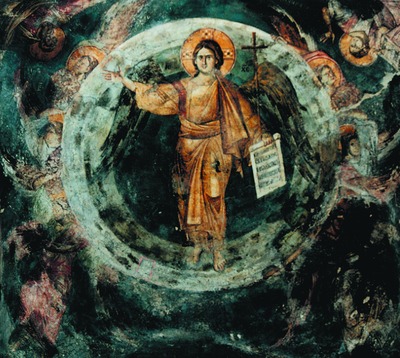
Christ the Angel of the Great Council
Church of the Mother of God Periblepta
c. 1295
Ochrid, Macedonia
Posted on 11/09/2014 7:05:55 PM PST by Salvation
The Days between the Resurrection and Ascension of Our Lord by St. Leo the Great [Catholic Caucus]
Pope Leo the Great
Pope St. Leo the Great - Early Church Father and Doctor of the Church
Pope St. Leo the Great and the Petrine Primacy
St. Leo the Great Pope of Rome February 18th
St. Leo the Great, Pope and Doctor of the Church
Saint Leo the Great - Defender of Rome and Codifier of Orthodoxy
THE CHRISTMAS HOMILY OF SAINT LEO THE GREAT ON THE FEAST OF THE NATIVITY - I
St. Leo the Great on Authority
St. Leo the Great on the Papacy"
St. Leo the Great
Feast Day: November 10
Born: (around) 400 :: Died: 461
St. Leo was born at Tuscany in Italy. He came from a noble Roman family and was a very good student especially in scripture and theology (religious studies). When he grew up, he became a priest and was a powerful writer and preacher.
When Pope Sixtus died in 440, St. Leo became pope. Those were difficult times for the Church. Barbarian armies of Attila the Hun were attacking Christians in many places.
Within the Church, some people were spreading heresies (false teachings about the faith), too. But St. Leo was one of the greatest popes there ever was. He was absolutely unafraid of anything or anyone. He had great trust in the help of the first pope, St. Peter the apostle and prayed to St. Peter often.
To stop the spread of false teachings, St. Leo explained the true faith with his famous writings. He called a Council to condemn the wrong teachings. Those who would not give up their mistaken beliefs were put out of the Church. And Pope Leo received back into the Church those who were sorry. He asked people to pray for them.
When Attila the Hun came to attack Rome, all the people were filled with fear. They knew that the Huns had already burned many cities. To save Rome, St. Leo rode out to meet the fierce leader, Attila.
The only weapon he had was his great trust in God. When they met, something wonderful happened. Attila, the cruel pagan leader, showed the pope great honor. He made a treaty of peace with him.
Attila said afterward that he had seen two mighty figures standing by the pope while he spoke. It is believed that they were the great apostles, Peter and Paul. They had been sent by God to protect Pope Leo and the Christians.
Because of his humility and charity, Pope Leo was loved by all. He was pope for twenty-one years. He died on November 10, 461.
| Luke | |||
| English: Douay-Rheims | Greek NT: Byzantine/Majority Text (2000) | Latin: Vulgata Clementina | |
| Luke 17 |
|||
| 1. | AND he said to his disciples: It is impossible that scandals should not come: but woe to him through whom they come. | ειπεν δε προς τους μαθητας ανενδεκτον εστιν του μη ελθειν τα σκανδαλα ουαι δε δι ου ερχεται | Et ait ad discipulos suos : Impossibile est ut non veniant scandala : væ autem illi per quem veniunt. |
| 2. | It were better for him, that a millstone were hanged about his neck, and he cast into the sea, than that he should scandalize one of these little ones. | λυσιτελει αυτω ει μυλος ονικος περικειται περι τον τραχηλον αυτου και ερριπται εις την θαλασσαν η ινα σκανδαλιση ενα των μικρων τουτων | Utilius est illi si lapis molaris imponatur circa collum ejus, et projiciatur in mare quam ut scandalizet unum de pusillis istis. |
| 3. | Take heed to yourselves. If thy brother sin against thee, reprove him: and if he do penance, forgive him. | προσεχετε εαυτοις εαν δε αμαρτη εις σε ο αδελφος σου επιτιμησον αυτω και εαν μετανοηση αφες αυτω | Attendite vobis : Si peccaverit in te frater tuus, increpa illum : et si pœnitentiam egerit, dimitte illi. |
| 4. | And if he sin against thee seven times in a day, and seven times in a day be converted unto thee, saying, I repent; forgive him. | και εαν επτακις της ημερας αμαρτη εις σε και επτακις της ημερας επιστρεψη λεγων μετανοω αφησεις αυτω | Et si septies in die peccaverit in te, et septies in die conversus fuerit ad te, dicens : Pœnitet me, dimitte illi. |
| 5. | And the apostles said to the Lord: Increase our faith. | και ειπον οι αποστολοι τω κυριω προσθες ημιν πιστιν | Et dixerunt apostoli Domino : Adauge nobis fidem. |
| 6. | And the Lord said: If you had faith like to a grain of mustard seed, you might say to this mulberry tree, Be thou rooted up, and be thou transplanted into the sea: and it would obey you. | ειπεν δε ο κυριος ει εχετε πιστιν ως κοκκον σιναπεως ελεγετε αν τη συκαμινω ταυτη εκριζωθητι και φυτευθητι εν τη θαλασση και υπηκουσεν αν υμιν | Dixit autem Dominus : Si habueritis fidem sicut granum sinapis, dicetis huic arbori moro : Eradicare, et transplantare in mare, et obediet vobis. |

Monday, November 10
Liturgical Color: White
Today is the Memorial of Pope St. Leo the
Great, Pope and Doctor of the Church. He
reigned as pope from 440 to 461 A.D. Many
of his writings still exist, including 96
sermons and 143 letters, providing insight
into early church history.
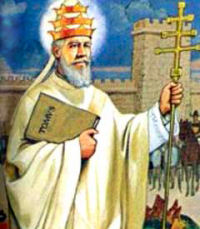
Daily Readings for:November 10, 2014
(Readings on USCCB website)
Collect: O God, who never allow the gates of hell to prevail against your Church, firmly founded on the apostolic rock, grant her, we pray, that through the intercession of Pope Saint Leo, she may stand firm in your truth and know the protection of lasting peace. Through our Lord Jesus Christ, your Son, who lives and reigns with you in the unity of the Holy Spirit, one God, for ever and ever.
RECIPES
o Fruit Cake in Grapefruit Shells
ACTIVITIES
o Namedays
o Practical Suggestions for Christian Living (Anointing of the Sick)
o Praying for the Dead and Gaining Indulgences During November
o Religion in the Home for Elementary School: November
o Religion in the Home for Preschool: November
o Teaching Children About Sickness and Death
PRAYERS
o November Devotion: The Holy Souls in Purgatory
o Little Litany of the Holy Souls
o Prayer for the Church, the Civil Authorities, Etc.
LIBRARY
o Christ Lives in His Church | St. Leo the Great
o Thursday of the Fourth Week of Lent | St. Leo the Great
o Tuesday of the Fourth Week of Lent | St. Leo the Great
· Ordinary Time: November 10th
· Memorial of St. Leo the Great, pope and doctor
Old Calendar: St. Andrew Avellino, priest; Sts.Tryphon, Respicius and Nympha, virgins and martyrs
Today the Church celebrates the memorial of St. Leo the Great, pope and doctor, during whose pontificate the Council of Chalcedon (451) defined that Christ is one divine person with two natures, divine and human. It was a confirmation of his Epistola Dogmatica (Tomus) to the Patriarch Flavian of Constantinople. He vigorously defended the unity of the Church. He detained the onrush of the barbarians under Attila. His feastday in the Extraordinary Rite is April 11.
According to the 1962 Missal of St. John XXIII the Extraordinary Form of the Roman Rite, today is the feast of St. Andrew Avellino who was born in Sicily and died at Naples. As a cleric he went to Naples to study law, and was meanwhile raised to the priestly dignity. Today is also the commemoration of Sts. Tryphon, Respicius and Nympha. Tryphon, a Phrygian, was martyred with his companion Respicius at Nicaea (c.250). Nympha was a virgin of Palermo, martyred in the fourth century.
St. Leo the Great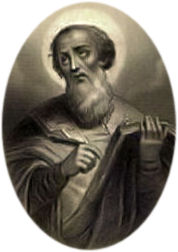 Leo I, Pope and Doctor of the Church, ruled from 440 to 461. He is surnamed "the Great" and ranks among the most illustrious sovereigns that ever sat on the throne of St. Peter. Of his life, we know little; with him the man seems to disappear before the Pope. He saw most clearly that one of his greatest tasks was to vindicate the primacy of the Roman bishop, St. Peter's successor, and to raise the prestige of the Holy See before the entire world. Hardly any Pope in history has occupied a like position in the ecclesiastical and political world.
Leo I, Pope and Doctor of the Church, ruled from 440 to 461. He is surnamed "the Great" and ranks among the most illustrious sovereigns that ever sat on the throne of St. Peter. Of his life, we know little; with him the man seems to disappear before the Pope. He saw most clearly that one of his greatest tasks was to vindicate the primacy of the Roman bishop, St. Peter's successor, and to raise the prestige of the Holy See before the entire world. Hardly any Pope in history has occupied a like position in the ecclesiastical and political world.
As a writer, too, his name is famous. His sermons, which occur frequently in the Divine Office, belong to the finest and most profound in patristic literature. The Council of Chalcedon was held under his direction (451). The Breviary tells us: Leo I, an Etruscan, ruled the Church at the time when Attila, King of the Huns, who was called the Scourge of God, invaded Italy. After a siege of three years, he took, sacked and burned Aquileia, and then hurried on toward Rome. Inflamed with anger, his troops were already preparing to cross the Po, at the point where it is joined by the Mincio.
Here Attila was stopped by Leo (452). With God-given eloquence, the Pope persuaded him to turn back, and when the Hun was asked by his servants why, contrary to custom, he had so meekly yielded to the entreaties of a Roman bishop, he answered that he had been alarmed by a figure dressed like a priest that stood at Leo's side; this individual was holding a drawn sword and acted as if he would kill him if he advanced farther. As a result Attila retreated to Pannonia.
Meanwhile, Leo returned to Rome, and was received with universal rejoicing. Some time later, the Vandal Genseric entered the city, and again Leo, by the power of his eloquence and the authority of his holy life, persuaded him to desist from atrocity and slaughter (455). Leo was also active in matters liturgical. The so-called Leonine sacramentary, a compendium of Missal prayers, contains
Excerpted from The Church's Year of Grace, Pius Parsch
Symbols: Image of the Virgin; pick-axe; model of St. Maria Maggiore; horse; Attila kneeling.
Things to Do:
St. Andrew Avellino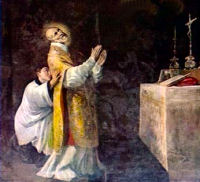 As a young priest Andrew served at an ecclesiastical court. While making a defense, a small lie slipped by his lips; soon afterward he accidentally read the words, "A lying mouth kills the soul" (Wis. 1:11). Deeply moved, he resigned his position and dedicated himself solely to the service of God and the welfare of souls. In 1566 he entered the Order of Theatines and chose the name Andrew out of love for the Cross of Christ. He labored most zealously as a shepherd of souls. With fatherly love and prudence he spent countless hours hearing confessions. He frequently visited the towns and villages in the neighborhood of Naples to preach the saving message of the Gospel.
As a young priest Andrew served at an ecclesiastical court. While making a defense, a small lie slipped by his lips; soon afterward he accidentally read the words, "A lying mouth kills the soul" (Wis. 1:11). Deeply moved, he resigned his position and dedicated himself solely to the service of God and the welfare of souls. In 1566 he entered the Order of Theatines and chose the name Andrew out of love for the Cross of Christ. He labored most zealously as a shepherd of souls. With fatherly love and prudence he spent countless hours hearing confessions. He frequently visited the towns and villages in the neighborhood of Naples to preach the saving message of the Gospel.
By means of miracles God Himself often glorified the love of neighbor burning in the heart of His holy priest. Once as he was returning home from a round of duties, the rain and wind extinguished the lantern he was carrying. He and his companion, however, were not soaked by the downpour. In fact, rays of light proceeded from his body and guided them through the dense darkness. Many came to him to settle cases of conscience, his letters number thousands. Worn out by work and enfeebled by age, he suffered a stroke at the foot of the altar just as he was beginning holy Mass and died as he repeated for the third time, "I will go unto the altar of God." He is venerated as patron against sudden death.
Excerpted from The Church's Year of Grace, Pius Parsch
Patron: Against sudden death; apoplexics; apoplexy; for a holy death; Naples, Sicily; stroke victims; strokes.
Things to Do:
Sts. Tryphon, Respicius and Nympha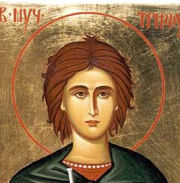 St. Tryphon, whose relics were preserved at Cattaro, in Dalmatia, had an oratory at Rome in which the Greeks celebrated his feast on February 1. For unknown reasons hagiographers have joined his commemoration with that of St. Respicius, who appears to have been a Roman martyr. St. Nympha was venerated at Porto in Sicily; her body, translated to Rome, was buried in the church of SS. Tryphon and Respicius. Due to lack of evidence this feast was removed from the General Roman Calendar in 1969.
St. Tryphon, whose relics were preserved at Cattaro, in Dalmatia, had an oratory at Rome in which the Greeks celebrated his feast on February 1. For unknown reasons hagiographers have joined his commemoration with that of St. Respicius, who appears to have been a Roman martyr. St. Nympha was venerated at Porto in Sicily; her body, translated to Rome, was buried in the church of SS. Tryphon and Respicius. Due to lack of evidence this feast was removed from the General Roman Calendar in 1969.
Patron: St. Trypon is the patron of gardeners.
![[Pope Saint Leo the Great]](http://saints.sqpn.com/wp-content/gallery/pope-saint-leo-the-great/pope-saint-leo-the-great-00.jpg) Also known as
Also known as
Profile
Born to the Italian nobility. Strong student, especially in scripture and theology. Priest. Eloquent writer and homilist.
Pope from 440 to 461 during the time of the invasion of Attila the Hun. When Attila marched on Rome, Leo went out to meet him and pleaded for him to leave. As Leo spoke, Attila saw the vision of a man in priestly robes, carrying a bare sword, and threatening to kill the invader if he did not obey Leo; Attila left. As Leo had a great devotion to Saint Peter the Apostle, it is generally believed the first pope was the visionary opponent to the Huns. When Genseric invaded Rome, Leo’s sanctity and eloquence saved the city again.
Called the Council of Chalcedon to condemn heresies of the day. Fought Nestorianism, Monophysitism, Manichaeism, and Pelagianism. Built churches. Wrote letters and sermons encouraging and teaching his flock, many of which survive today; it is for these writings that Leo was proclaimed a Doctor of the Church in 1574.
Born
Papal Ascension
Additional Information
Readings
Peter has spoken by the mouth of Leo. - Council of Chalcedon
Virtue is nothing without the trial of temptation, for there is no conflict without an enemy, no victory without strife. - Pope Saint Leo the Great
Although the universal Church of God is constituted of distinct orders of members, still, in spite of the many parts of its holy body, the Church subsists as an integral whole, just as the Apostle says: “We are all one in Christ,” nor is anyone separated from the office of another in such a way that a lower group has no connection with the head. In the unity of faith and baptism, our community is then undivided. There is a common dignity as the apostle Peter says in these words: “And you are built up as living stones into spiritual houses, a holy priesthood, offering spiritual sacrifices which are acceptable to God through Jesus Christ.” And again: “But you are a chosen people, a royal priesthood, a holy nation, a people of election.” For all, regenerated in Christ, as made kings by the sign of the cross. They are consecrated priests by the oil of the Holy Spirit, so that beyond the special service of our ministry as priests, all spiritual and mature Christians know that they are a royal race and are sharers in the office of the priesthood. For what is more king-like than to find yourself ruler over your body after having surrendered your soul to God? And what is more priestly than to promise the Lord a pure conscience and to offer him in love unblemished victims on the altar of one’s heart? - from a sermon by Pope Saint Leo the Great
God decreed that all nations should be saved in Christ. Dear friends, now that we have received instruction in this revelation of God‘s grace, let us celebrate with spiritual joy the day of our first harvesting, of the first calling of the Gentiles. Let us give thanks to the merciful God, “who has made us worthy,” in the words of the Apostle, “to share the position of the saints in light; who has rescued us from the power of darkness, and brought us into the kingdom of this beloved Son.” This came to be fulfilled, as we know, from the time when the star beckoned the three wise men out of their distant country and led them to recognize and adore the King of heaven and earth. The obedience of the star calls us to imitate its humble service: to be servants, as best we can, of the grace that invites all men to find Christ. - from a sermon by Pope Saint Leo the Great
Saint Leo the Great, Pope and Doctor of the Church
Forgive. (Luke 17:3)
Jesus wasn’t tiptoeing around the issue. Millstones are heavy. Large ones, like the one Jesus refers to in today’s Gospel reading, can weigh more than a ton. Still, we can get so focused on the millstone that we lose the heart of his central message here: if you have been sinned against, you need to forgive. Seven times or seven times seventy times, it amounts to the same thing: every time. Jesus wasn’t just offering a public rebuke to the ones who cause people to sin. He was telling all of us to forgive!
We have all been hurt at some time in our lives, and sometimes the memory of that hurt can stay with us for a long, long time. If we don’t deal with our pain through the gift of forgiveness, it can become a constant companion: a recurring complaint, a rancorous story told repeatedly, a sad movie that plays persistently in our thoughts. Whether we speak about the hurt or keep it bottled up inside, the result is the same: resentment and fear and shame deepen; bitterness festers. The chains that those emotions forge tighten and become heavier and heavier.
We don’t have to live in that kind of bondage! Forgiveness is the key. Forgive. And if the hurt resurfaces, forgive again. And again. Seven times seventy times, if necessary.
Sometimes, all you need is to take just one small step to forgive a hurt. Other times, you need to take a number of steps, over a long period of time, before you get your heart to a place where you can forgive. Whatever it takes, as long as you are trying to move forward, your heavenly Father will help you along.
Then there are those times when the pain is too sharp and the offense is too great for you to forgive. Know that even in these situations, God sees your heart, and he will ask you only to take the steps that you can take at that moment. Ever patient and compassionate, he is with you to help you and to heal your wounds.
So whatever your situation, picture your heavenly Father sitting next to you, his arm around your shoulder. Tell him what hurts. Tell him how hard it is to forgive. And ask him for his help. Give him time, just as he is giving you time, and he will help you take the next step. And the next one. And the next one.
“Father, help me to forgive. Heal me so that I can let go of anything that is holding me back!”
Titus 1:1-9; Psalm 24:1-6
Daily Marriage Tip for November 10, 2014:
Hoping for a baby? For some couples pregnancy comes easily but for those eagerly waiting, it can be physically and emotionally draining. Natural Family Planning can help couples identify their most fertile days and Naprotechnology can address underlying medical issues.
| Uprooting Sin | ||
|
||
|
November 10, 2014. Memorial of Saint Leo the Great, Pope and Doctor of the Church
|
||
|
|
||
|
By Father Edward Hopkins, LC. Luke 17:1-6 Jesus said to his disciples, "Things that cause sin will inevitably occur, but woe to the person through whom they occur. It would be better for him if a millstone were put around his neck and he be thrown into the sea than for him to cause one of these little ones to sin. Be on your guard! If your brother sins, rebuke him; and if he repents, forgive him. And if he wrongs you seven times in one day and returns to you seven times saying, ´I am sorry,´ you should forgive him." And the apostles said to the Lord, "Increase our faith." The Lord replied, "If you have faith the size of a mustard seed, you would say to (this) mulberry tree, ´Be uprooted and planted in the sea,´ and it would obey you. Introductory Prayer: I believe in you, Lord Jesus, as the only one who can fill my heart. I believe in the power of faith to change my life and the lives of others. I trust that you will grant me the light and strength to cast out sin from my life. I come to you in prayer so that I can love you even more with a firm but serene opposition to sin. Petition: Lord, may I desire “death before committing one sin.” 1. Causing Others to Sin: The negative effects of sin are many: offending God, damaging my conscience and soul, hardening my heart, forming bad habits, losing grace and will power, creating distance and difficulty in prayer, etc. But no result of sin is more damaging than that of scandal, where my sin leads others to sin. Why is this so serious? As a Christian I am called to live and teach Christ’s life to others. Scandal falsifies and contradicts my vocation and mission in life. We all have “little ones” entrusted to us: children, family members, those new to the faith, those searching, those who are especially weak…. If I am truly dedicated to lead them to Christ, then sin and scandal will have little room. How real and determined is my dedication? 2. Rebuke and Forgive: We must fight sin wherever we find it. How much more difficult does this become in a world where tolerance is ranked above virtue! Even in family life we are tempted to let things go and not create friction and uneasiness. But if sin is our greatest enemy, then we must always cast it out. The key is to do everything with the heart of Christ, a heart of love: ready to forgive the sinner, never judging their heart, but never minimizing an evil action. How well do I teach moral truth? Do I distinguish the sin from the sinner? Is Christ’s love always my motivation and dominant message? 3. Faith Uproots Sin: All of this -- fighting personal sin and helping others conquer it -- seemed a bit much for the apostles. They begged for an increase of faith. Faith of any size embraces God’s understanding of the evil of sin and seeks to live accordingly. Yet sin is not overcome easily, and mere understanding is not enough. We must uproot sin from our lives and reject it constantly in the lives of others. Only Christ’s love provides the strength we need, and often the perseverance in battling the same sins over time only comes through the strength that comes from Christ’s love. Only through Christ can our hearts be filled and not return to old habits of sin. Conversation with Christ: Give me, Lord, the courage to fight sin in my life. Grant me your heart, Lord, so I can fight and suffer without cowardice, without taking time out and without discouragement, even if others do not understand or thank me. Help me to uproot sin from my life and put you first. Resolution: I will fight to eradicate sins against charity in my family or work life. I will avoid it and call others to do so too in a gentle but firm manner. |
November 10, 2014
We cannot entirely avoid scandals. The Lord said. “They will necessarily come and cause people to fall.” Oftentimes our actions, our words and attitudes scandalize others. Sometimes we are not conscious of our actions, our words. We do not mean to scandalize but people who see our actions or hear our words are affected. The Lord gives us a very strong admonition. “It would be better for that one to be thrown into the sea with a millstone around his neck.”
In the first reading, Paul was writing to Titus, one of his faithful assistants in the service of the gospel, giving instructions to a select group of collaborators whom he sees worthy and are good Christian witnesses. He must be one who is hospitable, upright, devout and self-controlled.
With these qualifications, can we say that we who are church or pastoral workers are up to the standards set by St. Paul?
Seminaries which are schools for preparing men for the service of the church did not exist during the time of St Paul. But some of the teachings that come to us today are from these chosen collaborators. There is a need for us today to pray for missionaries who will dedicate themselves for the propagation of the faith. Most importantly, let us pray that young men and women of our parish respond to the invitation of God.
Our saint of the day — St. Leo, the Great, Pope and Doctor — was a pastor and father of souls. He safeguarded the integrity of the faith and defended the unity of the church.
Language: English | Español
All Issues > Volume 30, Issue 6
|
||||||||||||||||||||||||||||||||||||||||

Disclaimer: Opinions posted on Free Republic are those of the individual posters and do not necessarily represent the opinion of Free Republic or its management. All materials posted herein are protected by copyright law and the exemption for fair use of copyrighted works.